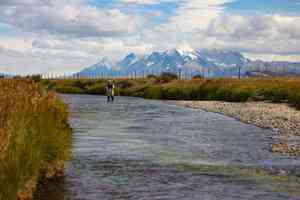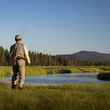“It was a great trip,” Christine said. “You can’t really appreciate Alaska until you’ve been there, and the scenery along the Alcan has to be seen to be believed. We had a great time. Still, it was an 8,500-mile round trip.” There was a pause on her end of the call. “It’s hard not to feel guilty. . . . How do you deal with that kind of thing?”
It wasn’t a rhetorical question. She’s a good friend, sharp as a razor, and far, far more aware of the realities of climate change than the typical American. She really wanted to know how I squared my lifestyle with my concern over the future.
I told her what Kathy and I had done in the name of reducing our climate footprint: the xeriscaping; the use of wild red meat and poultry in place of the domestic variety; the vegetable garden, too small to supply our year-round demand but enough to keep us in lettuce, tomatoes, carrots, and green beans for two or three months out of the year; the insulation; the compact fluorescent light bulbs, followed by the LEDs; the energy-efficient windows throughout the house; the Prius; the brand new furnace, said to provide heat with ninety-six percent efficiency; the eighteen solar panels on the roof.
These weren’t things we’d done in addition to the usual home improvements; they’d been done instead. Our finances have always been stretched by medical issues of various kinds, so, when it comes to the house, we’ve been forced to choose between long-term investments in energy efficiency and more typical spending on décor. Our carpets may well have been laid when the house was built in 1972— these days, the high-traffic areas are held together with gorilla tape. The kitchen is definitely original. The linoleum is wearing through to the subfloor in places and the particle-board cabinets are sagging perceptibly.
I think it’s fair to say we’ve made some sacrifices to reduce our impact on the planet. But I keep a four-wheel-drive pickup for my hunting and fishing. We make the 200-mile round-trip drive to Denver just to spend the day at the art museum or the botanic gardens. We drive to the grocery store and drive kids to the usual variety of jobs and avocational activities. We picnic in the mountains and, being westerners, think nothing of driving fourteen hours to see family and friends. Compared to the carbon footprint of a typical family in the Congo or Borneo, our contribution of CO2 to the atmosphere remains immense.
If the United States and the rest of the “developed world” had taken steps to reduce its economic reliance on carbon in the mid-1960s when scientists issued the first official warning on climate change or even in 1988 when James Hansen presented clear evidence of climate change to the United States Senate, we’d be comfortably on our way to a sustainable lifestyle with minimal sacrifices. If we’d taken the warnings to heart and started a serious conversion to carbon-free sources of energy, we might not even be talking about climate change now.
Of course, we didn’t, and we now find ourselves painted into a corner with no easy ways out. Many of the people closest to the problem say that, if we are to avoid catastrophic changes in global weather, we need to deal with it the way we dealt with the last world war. That means huge expenditures on alternative energy, drastic modifications to housing and other structures, a revolution in the way we produce food, our eating habits, and, in all likelihood, an end to the kind of profligate personal travel that has been one of the most pervasive hallmarks of American culture through most of the twentieth century.
And it leaves me pondering whether I should quit driving to the high-country streams I fish during the summer, the mountain ridges I hunt for elk in October, the grasslands of the high plains where my dogs and I pursue pheasants, prairie grouse, and quail at the end of the year. And there’s the rub. For me, for my friends, for many of you, these trips are more than simple relaxation, more than recreation— they’re a way of life. Giving them up strikes at the very heart of who we are.
It’s easy to do the right thing when the right thing doesn’t cost you anything. The test of commitment to a moral code comes when the price for that commitment is high. This is one of those times.
The trouble is that personal action won’t solve the problem of climate change. Back on the first Earth Day, the mantra of the environmental movement was, “Think globally; act locally.” It was a legitimate way of approaching many of the problems we had with land, water, and wildlife in 1970 ... but it won’t take care of this one. Only by acting globally will we avoid the worst of the consequences of our insatiable demand for fossil carbon. My LED bulbs and solar panels, by themselves, will do nothing, except possibly setting an example for a few neighbors and visitors.
Kathy and I knew that when we dented our limited budget to reduce our carbon footprint. We’ve done what we’ve done, not because it will make any material difference, but because it seemed like the right thing to do.
This leaves us somewhere in the gray netherworld of ethics. The perfectly moral thing to do would be to give away all our belongings, walk to Costa Rica, and spend the rest of our lives in a mud hut of our own construction. If that would save the world, I might even consider it, but until the people of America commit to a course forward, it would be an empty gesture. So I guess my answer to Christine’s question would be this: Do what you can to reduce your carbon footprint, not because it will help but because it’s the right thing to do.
And press for the change we so desperately need. Support a government that drives innovation and regulation so that every American bears a fair share of the burden that solving the climate problem will impose. Contribute to candidates who are clear in their support for real, immediate, drastic action. Demonstrate. Disrupt. Vote.
Think globally. Act globally. It’s the only way out.






























Comments
Paul D replied on Permalink
Thanks for this really thoughtful piece. My wife and I have been on the same page for decades, not just because we cared about climate change, but because reducing our footprint on the planet has been the right thing to do. The travel thing still troubles us, especially because some of our family lives on the other side of the planet. Yes, we need to do the right thing in our own lives, but we also need to help make sure the leaders we put in place commit to taking serious action.
Pages